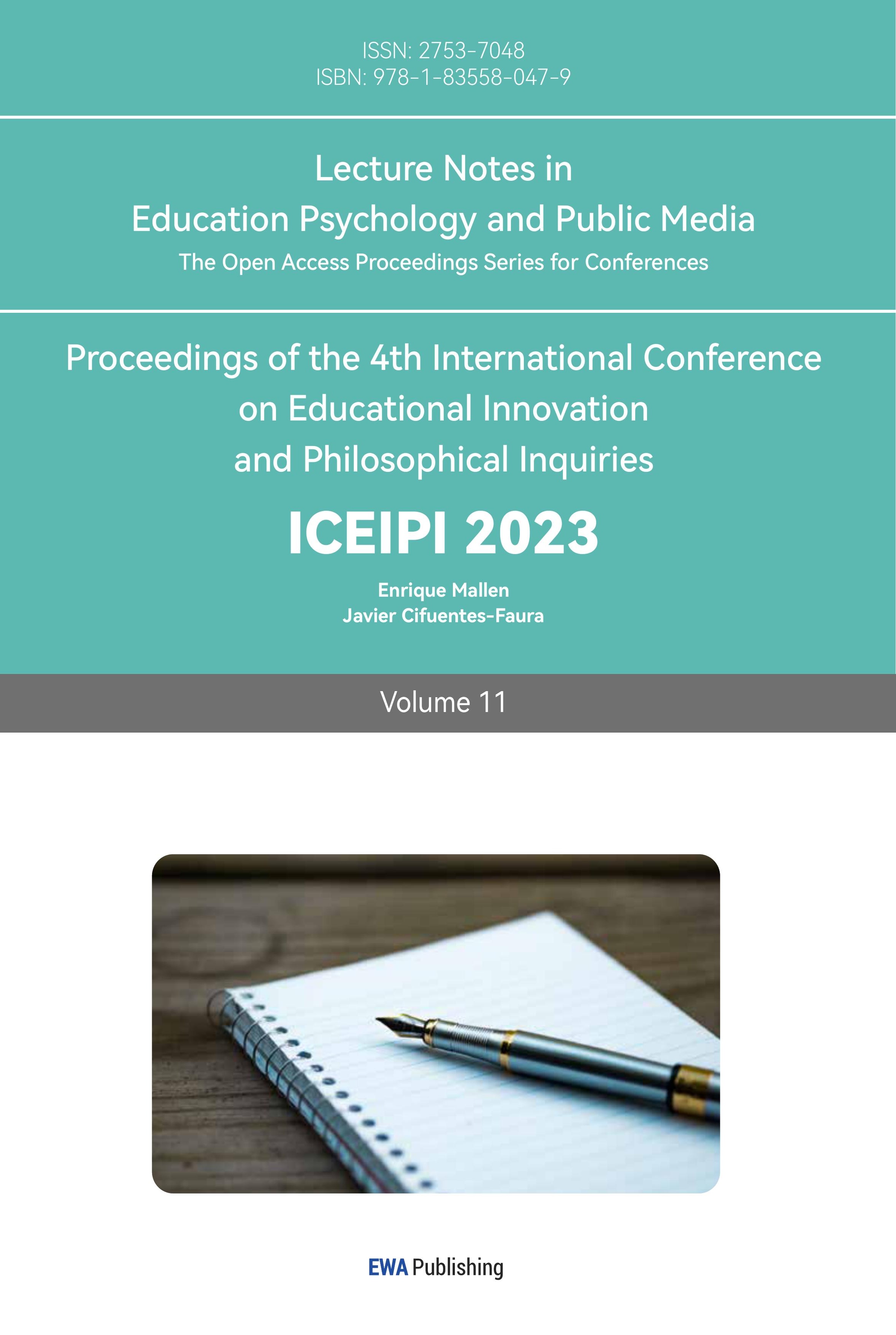References
[1]. China Federation of Internet Societies. (2022) Research report on current situation of juveniles’ online protection. http://www.cfis.cn/2022-08/01/c_1128880995.htm.
[2]. Akram, W., & Kumar, R. (2017). A study on positive and negative effects of social media on society. International Journal of Computer Sciences and Engineering, 5(10), 351-354.
[3]. Son, H. G., Cho, H. J., & Jeong, K. H. (2021). The effects of Korean parents’ smartphone addiction on Korean children’s smartphone addiction: Moderating effects of children’s gender and age. International Journal of Environmental Research and Public Health, 18(13), 6685.
[4]. Ye, F. & Xu, X. (2020). Motivation and Addiction of Adolescents’ Mobile Social Media: The Mediating Effects of FoMO. Information Studies: Theory & Application (10),108-114.
[5]. Hou, Y., Xiong, D., Jiang, T., Song, L., & Wang, Q. (2019). Social media addiction: Its impact, mediation, and intervention. Cyberpsychology: Journal of psychosocial research on cyberspace, 13(1).
[6]. Jeong, S. H., Kim, H., Yum, J. Y., & Hwang, Y. (2016). What type of content are smartphone users addicted to?: SNS vs. games. Computers in human behavior, 54, 10-17.
[7]. Liang, X. & Gan, C. (2017). Research on influencing factors of mobile social media addiction: Taking wechat as an example. Information Studies: Theory & Application, 40(1), 93-97.
[8]. Purba, A. W. D., Istiana, I., & Wahyuni, N. S. (2020). The Correlation Between Self-Control and Social Media Addiction (Instagram) In SMA Harapan 1 Medan.
[9]. Sagar, M. E. (2021). Predictive Role of Cognitive Flexibility and Self-Control on Social Media Addiction in University Students. International Education Studies, 14(4), 1-10.
[10]. Brevers, D., & Turel, O. (2019). Strategies for self-controlling social media use: Classification and role in preventing social media addiction symptoms. Journal of behavioral addictions, 8(3), 554-563.
[11]. Longstreet, P., & Brooks, S. (2017). Life satisfaction: A key to managing internet & social media addiction. Technology in society, 50, 73-77.
[12]. Park, C., & Park, Y. R. (2014). The conceptual model on smart phone addiction among early childhood. International Journal of Social Science and Humanity, 4(2), 147.
Cite this article
Ma,L. (2023). Research on the Influence of Parental Behavior on Children’s Social Media Addiction. Lecture Notes in Education Psychology and Public Media,11,145-151.
Data availability
The datasets used and/or analyzed during the current study will be available from the authors upon reasonable request.
Disclaimer/Publisher's Note
The statements, opinions and data contained in all publications are solely those of the individual author(s) and contributor(s) and not of EWA Publishing and/or the editor(s). EWA Publishing and/or the editor(s) disclaim responsibility for any injury to people or property resulting from any ideas, methods, instructions or products referred to in the content.
About volume
Volume title: Proceedings of the 4th International Conference on Educational Innovation and Philosophical Inquiries
© 2024 by the author(s). Licensee EWA Publishing, Oxford, UK. This article is an open access article distributed under the terms and
conditions of the Creative Commons Attribution (CC BY) license. Authors who
publish this series agree to the following terms:
1. Authors retain copyright and grant the series right of first publication with the work simultaneously licensed under a Creative Commons
Attribution License that allows others to share the work with an acknowledgment of the work's authorship and initial publication in this
series.
2. Authors are able to enter into separate, additional contractual arrangements for the non-exclusive distribution of the series's published
version of the work (e.g., post it to an institutional repository or publish it in a book), with an acknowledgment of its initial
publication in this series.
3. Authors are permitted and encouraged to post their work online (e.g., in institutional repositories or on their website) prior to and
during the submission process, as it can lead to productive exchanges, as well as earlier and greater citation of published work (See
Open access policy for details).
References
[1]. China Federation of Internet Societies. (2022) Research report on current situation of juveniles’ online protection. http://www.cfis.cn/2022-08/01/c_1128880995.htm.
[2]. Akram, W., & Kumar, R. (2017). A study on positive and negative effects of social media on society. International Journal of Computer Sciences and Engineering, 5(10), 351-354.
[3]. Son, H. G., Cho, H. J., & Jeong, K. H. (2021). The effects of Korean parents’ smartphone addiction on Korean children’s smartphone addiction: Moderating effects of children’s gender and age. International Journal of Environmental Research and Public Health, 18(13), 6685.
[4]. Ye, F. & Xu, X. (2020). Motivation and Addiction of Adolescents’ Mobile Social Media: The Mediating Effects of FoMO. Information Studies: Theory & Application (10),108-114.
[5]. Hou, Y., Xiong, D., Jiang, T., Song, L., & Wang, Q. (2019). Social media addiction: Its impact, mediation, and intervention. Cyberpsychology: Journal of psychosocial research on cyberspace, 13(1).
[6]. Jeong, S. H., Kim, H., Yum, J. Y., & Hwang, Y. (2016). What type of content are smartphone users addicted to?: SNS vs. games. Computers in human behavior, 54, 10-17.
[7]. Liang, X. & Gan, C. (2017). Research on influencing factors of mobile social media addiction: Taking wechat as an example. Information Studies: Theory & Application, 40(1), 93-97.
[8]. Purba, A. W. D., Istiana, I., & Wahyuni, N. S. (2020). The Correlation Between Self-Control and Social Media Addiction (Instagram) In SMA Harapan 1 Medan.
[9]. Sagar, M. E. (2021). Predictive Role of Cognitive Flexibility and Self-Control on Social Media Addiction in University Students. International Education Studies, 14(4), 1-10.
[10]. Brevers, D., & Turel, O. (2019). Strategies for self-controlling social media use: Classification and role in preventing social media addiction symptoms. Journal of behavioral addictions, 8(3), 554-563.
[11]. Longstreet, P., & Brooks, S. (2017). Life satisfaction: A key to managing internet & social media addiction. Technology in society, 50, 73-77.
[12]. Park, C., & Park, Y. R. (2014). The conceptual model on smart phone addiction among early childhood. International Journal of Social Science and Humanity, 4(2), 147.









